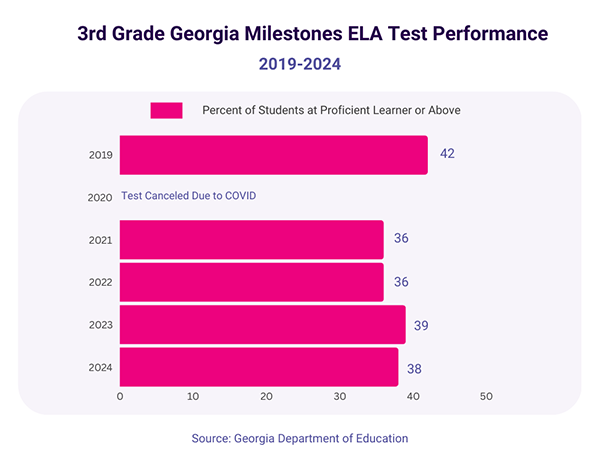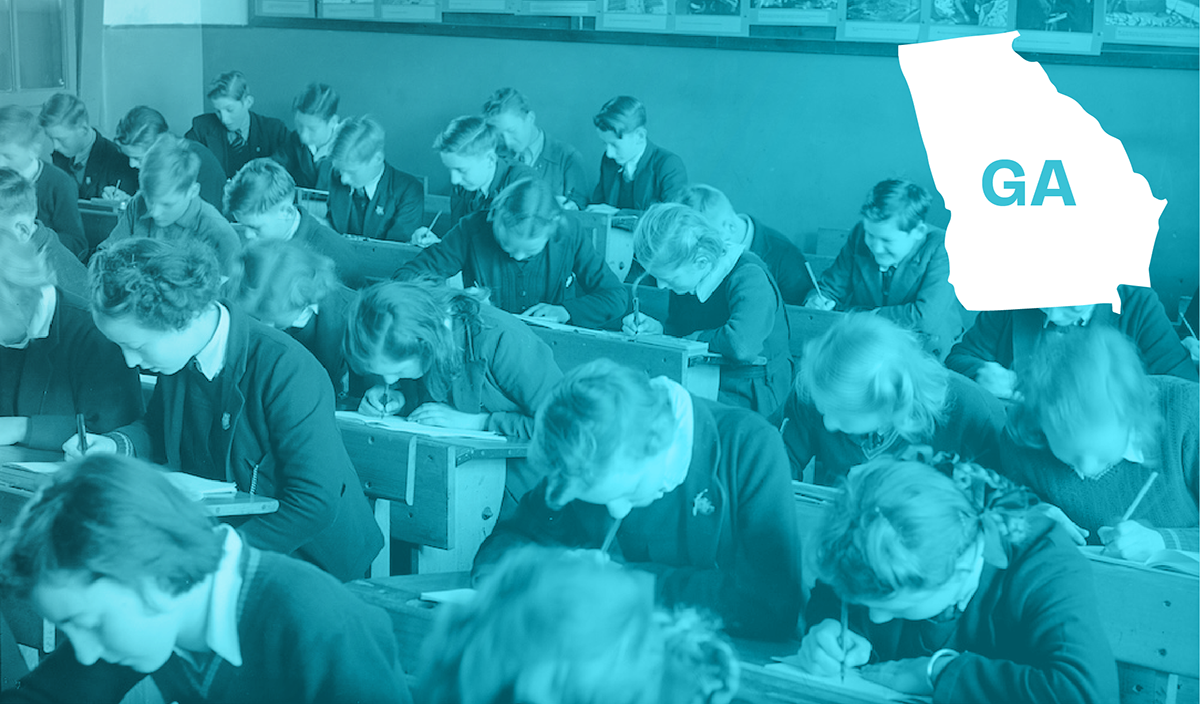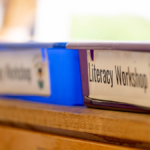Year after year, the Georgia Milestones Assessment System (GMAS) test scores show far too few Georgia 3rd graders are reading at proficient levels. Where should district and school leaders be looking to reverse that trend?
It’s a lot earlier than you might think … two whole years earlier.
An increasing amount of evidence points to 1st grade reading performance as a key predictor of whether or not students will be proficient readers by the time 3rd grade rolls around. It’s estimated that 83% of kids who are on benchmark for phonics in 1st grade will be on benchmark for all reading skills in 3rd grade.
So, how do you give your 1st graders the reading start they need for future success on the Georgia Milestones Assessment … and beyond?
The Georgia Early Literacy Act (House Bill 538) already has districts across the state making big changes to comply with new mandates. Read on to learn how to ensure these changes build a solid reading foundation for your 1st graders, plus how to help 3rd graders so they don’t fall farther behind.
Georgia Milestones Reading Test Scores
Georgia’s reading test scores in spring 2024 followed a pattern all too familiar across the U.S.. Just 38 percent of 3rd graders scored at Proficient Learner or above on the English Language Arts (ELA) portion of the Georgia Milestones test, meaning 62 percent did not reach that proficiency benchmark.
Much of the blame has been placed on COVID-19, but the number of 3rd graders who are not reaching proficiency on the year-end test has remained fairly constant since it was introduced in 2014-15.

A look at scores from 2019 — the year before the pandemic began — reveals 58 percent of 3rd graders did not meet the proficiency benchmark that year, just four percentage points behind 2024 scores.
This is not a COVID-19 problem, and it is a solvable one.
That solution lies in taking a hard look at the timing of reading skills assessments and what skills are assessed.
A Look at Timing: Georgia’s Reading Skills Assessment Starts in 3rd Grade
Georgia has long required that reading skills assessments begin in 3rd grade with a standardized test — just like other states in the U.S. Since the 2014-15 school year, that test has been the GMAS.
Third grade test-takers are naturally assessed on content that aligns to standards from the English Language Arts Georgia Standards of Excellence (ELAGSE) for 3rd graders.
Those standards focus on comprehension skills, including reading literary skills, such as describing characters’ motivations, feelings, and actions, and reading informational skills, like using sequence and cause and effect to describe relationships between events or concepts.
Essentially, this test gives districts and schools an understanding of students’ reading comprehension — their ability to read and explain complex texts at grade level.
What a 3rd grade assessment misses is that many students enter 3rd grade without having mastered the skills to read text in the first place. How are students supposed to comprehend text if they can’t even read it?
This is the fundamental problem of waiting until 3rd grade to begin reading assessments.
Forming a Foundation for Reading
Kids cannot develop reading comprehension if they haven’t first become proficient in foundational reading skills like phonics, skills that appear in the ELAGSE 1st grade standards only. The Science of Reading tells us this isn’t just a standards requirement — it’s how the human brain learns to read.
Extensive research tells us that kids need to master a range of foundational reading skills — including phonological awareness, decoding, and sight recognition — in order to be able to read with fluency. Once they’re fluent readers, students can then apply their cognitive energy to the work necessary to draw meaning from the text.
Think of it a bit like learning to ride a bike.
At the start, kids have to learn the basics — how to balance on two wheels, how to pedal with both feet at the same time, and how to use the handlebars to steer the bike. Learning each of these skills requires concentration, and the rider has to focus their mental energy on each motion.
It takes a lot of practice to master each component skill, and some kids require more practice than others. Once they reach the point where they’re able to balance the bike without training wheels, pedal at a regular rate of speed, and steer their bicycle, these skills become automatic to the point where they no longer have to think about moving their feet up and down and up and down.
Now their minds are freed up to focus on looking around them, anticipating that dog running up ahead of them that they’ll have to steer the bike around or preparing for the upcoming hill by beginning to pump their legs harder.
The same is true of learning to read. Some kids need more practice than others for those “component” or foundational skills to become automatic, freeing up the brain for the hard work of comprehension.
Studies show that if a student isn’t reading on grade level — meaning they have not mastered these foundational skills — by the start of 2nd grade, there is a 90 percent chance they’ll still be reading below grade level at the end of 3rd grade and into 4th grade.
On the other hand, 1st grade skills mastery correlates to future reading achievement — almost all 1st graders who are on benchmark for phonics will be on benchmark for all reading skills in 3rd grade.
By 3rd grade, Georgia students are expected to have reached this level of fluency, meaning they already know how to apply 1st grade-level phonics and word analysis skills in order to comprehend.
What happens if your 3rd graders haven’t yet mastered the foundational skills they need to tackle the comprehension skills on the Georgia Milestones test? GMAS scores won’t reflect those gaps because the test is not designed to assess foundational reading skills.
There’s no way to tell if a child who did not score at proficiency levels did so because they have not yet mastered comprehension skills or if it was because they hadn’t mastered the skills to read the questions themselves. Nor can you identify which foundational skills gaps students have in order to address them.
But with more than 60 percent of 3rd graders not reaching proficient ELA levels on the test, there’s a strong indication that many Georgia students have gaps in their foundational reading skills.
Improving Georgia Milestones Scores & Student Outcomes
Complying with the requirements of the Georgia Literacy Act will make a significant impact on helping 3rd graders who are underperforming on the GMAS to close their foundational reading skills gaps and keep 1st graders from falling behind in the first place.
And, there’s even more you can do now to make a difference.
Ensure Supplemental Materials Are Evidence-Based
Thanks to the Literacy Act, districts have already been required to adopt new high quality core instructional materials and a new core reading curriculum from the State Board of Education (SBOE) list, but it’s equally important that any supplemental materials teachers are using to teach reading in your K-3 classrooms are also designed to systematically and explicitly teach foundational reading skills.
Unfortunately, studies have discovered a wide variety in the quality of materials that a majority of teachers source online to augment core instruction. Many supplemental resources are weak when it comes to clarity and instructional guidance for teachers, and a significant number don’t align to academic standards. Using these low quality materials counteracts the benefits of adopting a Science of Reading focus for core instruction.
In order to bring supplemental materials in line, district and school leaders can do the following:
- On both the district and school level, emphasize fidelity to the core curriculum in the delivery of instruction by teachers and interventionists. Studies have found this significantly limits teachers’ dependence on supplemental materials.
- Ensure teachers have the Georgia Department of Education (GADOE) rubric for evaluating supplemental material, and provide additional training to teachers on how to best choose evidence-based materials.
- If possible, create a repository of supplemental materials that have already been vetted by your district’s curriculum specialists.
Implement a Comprehensive Plan for Assessment
With the new requirement that Georgia schools administer three approved universal reading screeners each school year to every K–3rd grader, you won’t have to wait until 3rd grade to find out a student cannot pass a comprehension test because they still lack basic foundational reading skills. Educational staff will have actionable assessment information which can be used to ensure students receive interventions on time.
Three screeners a year is a good start, but a comprehensive assessment plan should include frequent low stakes assessments that provide more real-time data for those students receiving reading intervention.
In order to ensure interventions are meeting students’ precise needs, it’s important to also implement ongoing progress monitoring. The exact cadence can vary, depending on a student’s interventional tier, but monitoring should occur at least monthly, and data should be graphed. This allows teachers to track incremental progress and student knowledge growth over time to guide reteaching and differentiation efforts and reassign students who have met benchmarks. This data also informs how to regroup kids in order to ensure that they continue to get targeted instruction to fill their gaps and move them along the continuum of learning to read.
Helpful Resource
- Georgia Formative Instructional Practices offers free evidence-based professional learning on how to best use progress monitoring assessment data in the classroom.
Establish a Plan for Early Reading Interventions
A strong Tier 1 curriculum, aligned supplemental materials, and regular assessments will go a long way toward improving students’ reading skills … and their Georgia Milestones scores.
Still, reading research shows 60 percent of students will need more than core instruction to learn to read. Their brains require code-based, explicit, systematic instruction in order to master foundational reading skills.
To give these students the level of instruction they need to succeed, schools need an intentional approach to intervention that’s driven by assessment data and rooted in evidence-based practice:
- Ensure students who are at risk of not reaching or maintaining their academic grade level, receive evidence-based supports aligned with both Georgia’s Early Intervention Program (EIP) and the Georgia Tiered System of Supports (GaTSS) framework of evidence-based practices and data-based decision-making.
- Consider implementing a quality high-dosage tutoring program that provides 1:1 differentiated instruction for at-risk 1st grade readers. This type of on-time intervention gives 1st graders the foundational reading tools they need to finish the school year on benchmark.
Helpful Resource
- GADOE has created a toolkit for leaders that provides a guide for implementing literacy interventions that are evidence-based.
The Future of Reading Instruction in Georgia
There’s little question that many of our 3rd graders need help to improve their reading proficiency, but efforts can’t focus solely on 3rd grade. We need to develop a comprehensive approach to early reading instruction that puts our 1st graders on a path to long term success.
Getting there means prioritizing the early detection of reading skills gaps, providing continuous support for struggling readers, and committing to effective, evidence-based instructional strategies.
About Ignite Reading
Ignite Reading delivers 1:1 online tutoring to students who need extra support in learning to read. Our expert tutors teach students the foundational skills they need to become confident, fluent readers by the end of 1st grade.
With a team of literacy specialists and highly trained tutors, we provide daily, targeted instruction that quickly closes decoding gaps, so students can successfully make the transition from learning to read to reading to learn.



